The SWOT Analysis of Vietnam Mycorrhizal Biofertilizers Market

Strong 8k brings an ultra-HD IPTV experience to your living room and your pocket.
The agricultural landscape in Vietnam is rapidly evolving, with a growing emphasis on sustainable practices to meet the increasing demands of food production while minimizing environmental impact. Among these sustainable practices, mycorrhizal biofertilizers have emerged as a vital solution, enhancing soil health and improving crop yields. This blog will provide an overview of the Vietnam mycorrhizal biofertilizer market and conduct a SWOT analysis to identify its strengths, weaknesses, opportunities, and threats.
Vietnam Mycorrhizal Biofertilizer Market Overview
Vietnam is one of the largest agricultural producers in Southeast Asia, with a diverse range of crops cultivated across its various climatic zones. The country has been increasingly adopting organic farming practices, driven by consumer demand for healthier food options and government initiatives promoting sustainable agriculture. The mycorrhizal biofertilizer market in Vietnam is gaining traction as farmers seek effective solutions to enhance soil fertility without relying on chemical fertilizers.
As of 2022, the mycorrhizal biofertilizer market in Vietnam was valued at approximately USD 143.7 thousand and is projected to grow at a compound annual growth rate (CAGR) of around 10.5% from 2023 to 2028. Factors contributing to this growth include rising health consciousness among consumers, government support for organic farming, and increasing technological advancements in biofertilizer production.
SWOT Analysis
Strengths
- Diverse Agricultural Base: Vietnam's varied climate allows for the cultivation of a wide range of crops, making it an ideal market for mycorrhizal biofertilizers that can enhance productivity across different agricultural sectors.
- Government Support: The Vietnamese government is actively promoting sustainable agricultural practices through policies that encourage the use of biofertilizers. Initiatives such as subsidies for organic farming and support for research and development are boosting the adoption of mycorrhizal biofertilizers.
- Growing Demand for Organic Products: With increasing consumer awareness about health and environmental issues, there is a rising demand for organic produce in Vietnam. This trend is driving farmers to seek sustainable solutions like mycorrhizal biofertilizers.
- Technological Innovations: Advances in biotechnology are leading to the development of more effective strains of mycorrhizal fungi and improved formulations that enhance the performance of these biofertilizers.
Weaknesses
- Limited Awareness Among Farmers: Despite the benefits of mycorrhizal biofertilizers, many farmers remain unaware of their advantages compared to traditional fertilizers. This lack of knowledge can hinder adoption rates.
- Fragmented Supply Chain: The distribution network for mycorrhizal biofertilizers in Vietnam is still developing, leading to challenges in accessibility for smallholder farmers who may not have easy access to these products.
- Higher Initial Costs: The cost of mycorrhizal biofertilizers can be higher than that of conventional fertilizers, which may deter some farmers from making the switch, especially those operating on tight budgets.
- Regulatory Challenges: Navigating the regulatory landscape can be complex for companies producing mycorrhizal biofertilizers. Compliance with local regulations regarding agricultural inputs can pose challenges for market entry and expansion.
Opportunities
- Rising Export Potential: As global demand for organic products increases, Vietnam's mycorrhizal biofertilizer market has significant export potential. Manufacturers can capitalize on international markets seeking sustainable agricultural solutions.
- Expansion into New Crop Segments: There is an opportunity to expand the use of mycorrhizal biofertilizers into new crop segments beyond traditional staples like rice and vegetables, including fruit orchards and cash crops such as coffee and tea.
- Collaborations with Research Institutions: Partnerships between manufacturers and research institutions can lead to innovations in product development and improved efficacy of mycorrhizal formulations tailored to local conditions.
- Increased Investment: Growing interest in sustainable agriculture is attracting investment into the mycorrhizal biofertilizer market, enabling companies to scale operations and improve product quality.
Threats
- Climate Change Impacts: Changes in climate patterns can adversely affect agricultural productivity and soil health, potentially impacting the effectiveness of mycorrhizal biofertilizers.
- Competition from Chemical Fertilizers: Despite the benefits of mycorrhizal biofertilizers, chemical fertilizers remain dominant in the market due to their widespread availability and lower upfront costs.
- Pest and Disease Outbreaks: Increased incidence of pests and diseases can lead to significant crop losses, affecting farmers' willingness to invest in new agricultural inputs like mycorrhizal biofertilizers.
- Market Saturation Risks: As more players enter the market, there is a risk of oversaturation, which could lead to price wars and reduced profitability for manufacturers.
In conclusion, the Vietnam mycorrhizal biofertilizer market is positioned for significant growth, driven by increasing awareness of sustainable agriculture, government support, and rising consumer demand for organic products. Key players such as Atlantica Agricola and BIOWAY are actively contributing to this growth through innovative solutions tailored to local farming needs. While challenges such as limited farmer awareness and a fragmented supply chain exist, the opportunities for expansion into new crop segments and increased investment in research and development present a promising outlook. As Vietnam continues to prioritize eco-friendly farming practices, the adoption of mycorrhizal biofertilizers will play a crucial role in enhancing agricultural productivity and environmental sustainability.
Note: IndiBlogHub features both user-submitted and editorial content. We do not verify third-party contributions. Read our Disclaimer and Privacy Policyfor details.







